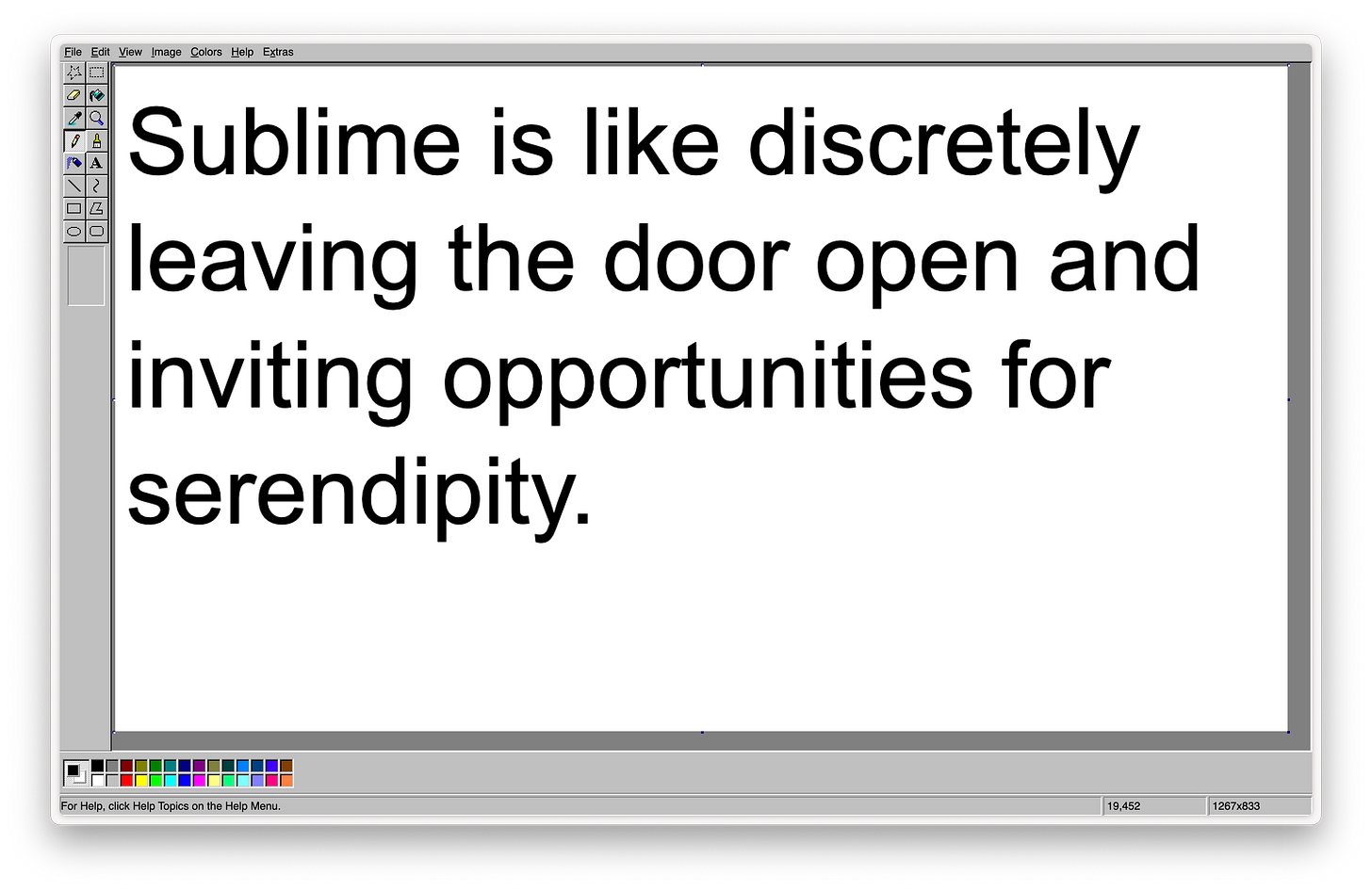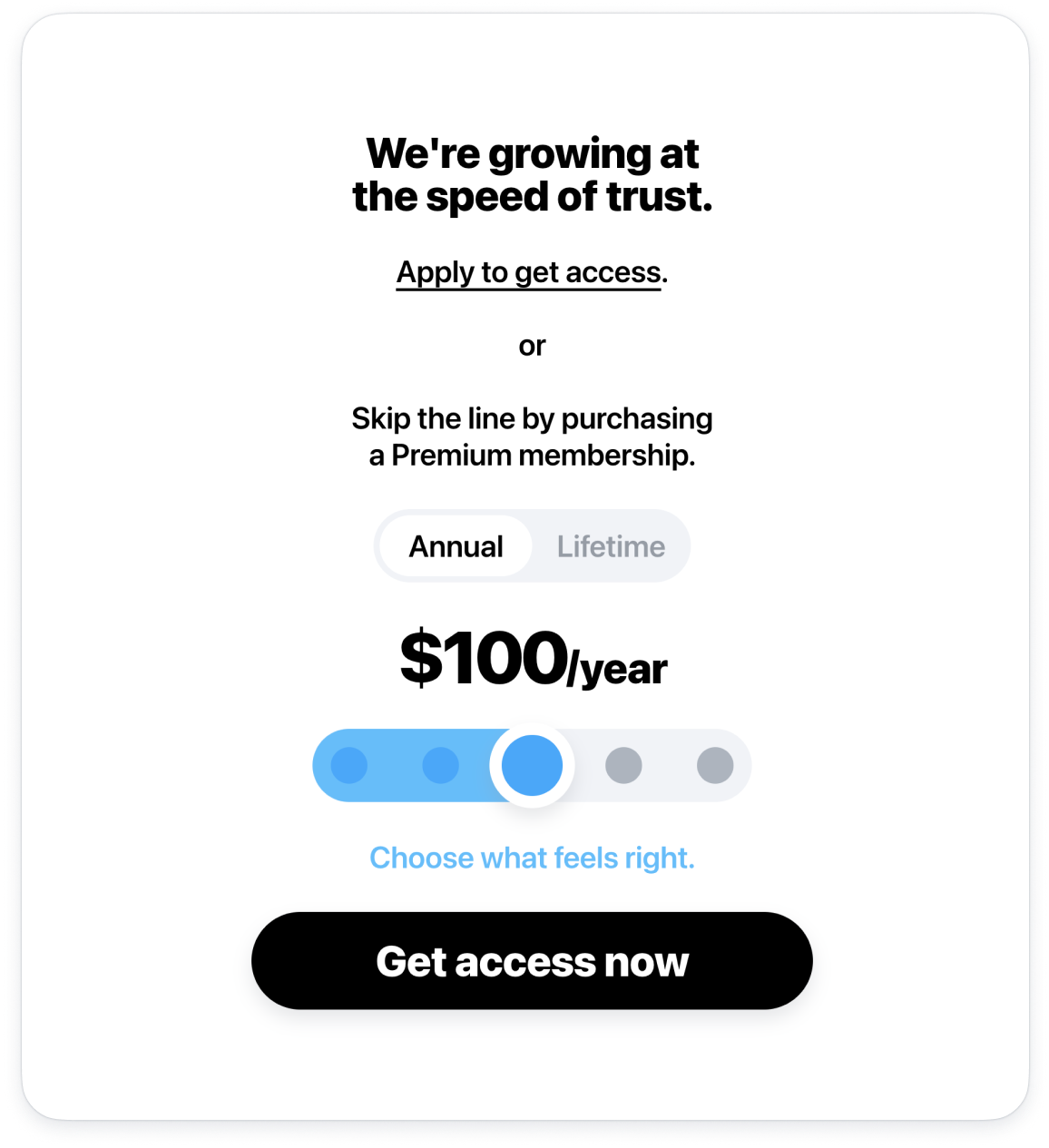Problems Sublime solves—at least for me
I'm just making something that doesn't exist that I'd want to use myself
I’ve shared my thoughts and vision for a more sublime Internet—the future of search, why the Internet makes us hate ourselves, and the end of productivity.
But here's the trap founders (myself included) often fall into: most people don't give a damn about your vision. They care about what your product can do for them today.
Imagine you're Jeff Bezos in the 90s.
You've got this earth-shattering realization: The Internet is about to change everything. That's your systems-level insight. It's huge, it's exciting, and... it's completely useless on its own. So what do you do? You zoom in. Way in. Find that one person pulling their hair out because they can't find a specific book in their local store. Bingo.
Now imagine you’re me in the 2020’s. First off, you have three kids under the age of six. Good luck, lol.
Also, the Internet is enshittified, Google has been SEO’d into ruin, and all of this is about to get worse with the explosion of AI manufactured garbage flooding the web. Human curation will become infinitely more valuable. That’s the insight. It’s huge, it’s exciting, and… it’s completely useless on its own.
So what do I do? I zoom in. Find a wedge. There’s thousands of people (like me) tired of laboring away in their solo, ugly, complicated knowledge management tools, and many more who are sending themselves quotes and links to remember via email or WhatsApp. Bingo.
Enter… Sublime.
Solving the problem of forgetting the interesting things you come across
If you're paid to think for a living, all those hours you spend consuming content—articles, podcasts, highlights, books, tweets—mean nothing if you can’t remember or find any of it when you actually need it.
Your brain is for having ideas, not for storing them.
That’s where Sublime comes in.
Sublime gives you a simple way to collect everything you want to remember. You can save text (highlights, notes), links (articles), books, podcasts, images (screenshots), pdfs, videos, and more. And we index everything smartly so you can easily search and retrieve anything you’re looking for.
Solving the problem of your inspiration being scattered across platforms
The things you find interesting are all over the place.
The WhatsApp chat with yourself. The screenshots on your desktop. The highlights on your Kindle. The bookmarks in your browser…
Sublime gives you a single place to gather it all.
You can save anything from anywhere, and you can also auto-sync your content from different apps (Kindle and Readwise highlights, plus Twitter and Instagram bookmarks soon).
The result: Sublime turns your scattered inspiration into an HQ for your knowledge and ideas—accessible anyplace, anytime.
Solving the problem of steep learning curves in knowledge management tools
We’re not the first to build a tool that lets you curate a knowledge library.
But we are the first to build one with no learning curve.
Tools like Notion let you do pretty much anything but will require watching 17 YouTube tutorials, and paying $699 for a course to actually figure out how to do any of it.
Sublime is for people who value simplicity and a beautiful user experience above all else.
For people that cannot get into flow state in a tool that looks like this:
For people who prefer a knowledge tool with yoga studio vibes:
Solving the problem of collecting ideas but not connecting them
The magic of creative work comes after you collect ideas and start to find the connections between them.
Tools like Notion or Evernote aren’t built to help you make the most of what you’ve collected. They feel unnatural because humans don’t think in folders and categories; we thrive on connections and associations.
As Austin Kleon said,
Creativity is about connections, and connections are not made by siloing everything off into its own space. New ideas are formed by interesting juxtapositions, and interesting juxtapositions happen when things are out of place.
Sublime supports connection-making in two ways:
Everything you add to Sublime—an article, a highlight, an image, a note, a screenshot—becomes a card that can live in various contexts.
Here’s an example:
I came across a cool quote in an article by Ezra Klein and it reminded me of why curation is important. It also belongs in my collection of dreams for a better Internet (which became a zine). And it was another validating breadcrumb for my Making Sublime collection.
On Sublime, I quickly added it to all three collections. Using Notion for this would be like trying to parallel park a cruise ship—technically possible (I think), but you might want to clear your schedule for the day.On Sublime, every idea is a portal to related ideas.
Let’s say you save a quote to a “Quotes” page in your Apple Notes. You can add more quotes to the page, sure, but that’s the extent of its world.
In Sublime, you can add that same quote (privately or publicly) and it will instantly surface related ideas—from your library and other people’s.
Sublime is not just a memory system, as these tools conventionally are, and more of a generative tool, inviting endless play and exploration.
Solving the problem of having a lot of inspiration but struggling to access it when you actually need to use it in your creative process
Most tools treat the process of consuming and the process of creating as distinctly different—we consume articles full of words, but write in an empty Google Doc. It’s like we are expected to gather ingredients in one kitchen and cook the meal in another.
Sublime bridges the gap between curation and creation by bringing you the right idea, exactly when you need it.
When I’m writing in Google Docs, any time I get stuck with a concept, I can select a sentence, press “CTRL” + “R”, and Sublime’s browser extension (available in Chrome, Safari, Firefox, and Arc) will pull up relevant ideas, like this:
Solving the problem of wanting but not having access to people’s behind-the-scenes thinking
I don’t just want the finished product. I want the raw, messy, unpolished behind-the-scenes stuff.
I don’t just want to know what you think.
I want to see how you arrived at what you think.
In a world where output is commoditized, the artifacts of humanity that offer a raw window into someone’s mind will become more and more valuable.
McLuhan famously said, the medium is the message.
With Sublime, the medium — messy, nonlinear ideas, inspirations, and insights before they coalesce into something final — is the message.
Take
Solving the problem of feeling like you are wasting hours laboring away in a solo knowledge tool, forced to choose between a monk’s cell or Times Square
For years, I collected insights and knowledge in private spaces no one could access. I found that to be a huge loss.
Every brain holds useful information but the majority of it doesn’t get shared. The bar for publishing is too high. Twitter and places like it turn everything into a giant popularity contest of likes and follows.
Most social networks are the equivalent of opening your door and shouting at your neighbors (narcissistic).
Private note-taking tools are the equivalent of shutting your door (lonely).
Sublime offers a middle ground where you can quietly generate a public archive of your knowledge and ideas, free from likes, comments, and vanity metrics.
Solving the problem of trying to find anything useful on Google without typing “Reddit” or “Substack” after the search
For a long time, I’ve dreamed of a curated, semantically searchable library for the world’s best ideas and concepts.
Google is great at answering questions with an objective answer, like “# of billionaires in the world” or “What is the population of Iceland.” But it’s pretty bad at answering questions that require judgment and context like “What do interesting thinkers have to say about AI and creativity?”
Not all questions seek answers, some seek journeys.
If Google and Perplexity are about getting conclusive answers, Sublime is about living the questions. About taking the scenic route through a human-curated landscape of ideas.
If you’ve made it this far and are using Sublime, I’d love to know—what problem does it solve for you?
And if you made it this far and are not yet on Sublime, I genuinely think you’ll love it. Join our private beta!
We have a choose-what-feels-right pricing model that gets you:
Unlimited access to everything sublime.app has to offer
Members-only gatherings, workshops, and live Q&As
Access to our paid Substack posts
A peek at our vision deck
20% off our zines—next one drops next week!
Plus, the warm and fuzzy feeling of supporting a company whose values you believe in














trying to use notion often drives me to tears lol
This all sounds great, but switching costs are too high. If there were a way to seamlessly migrate my decade long collection in Evernote over to Sublime, I'd be in to give it a shot :)